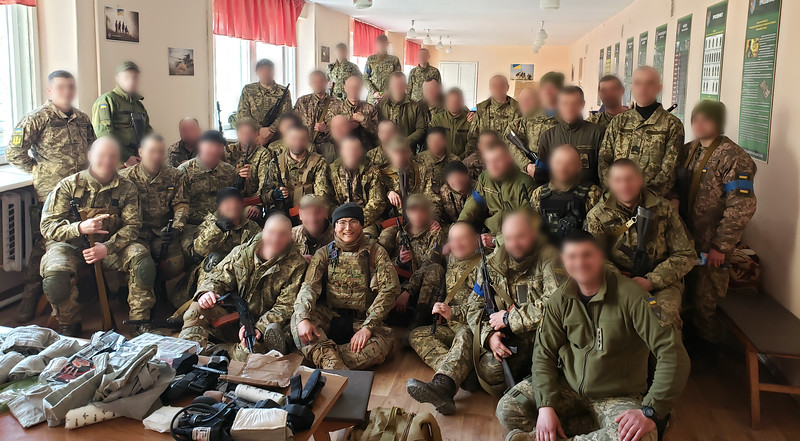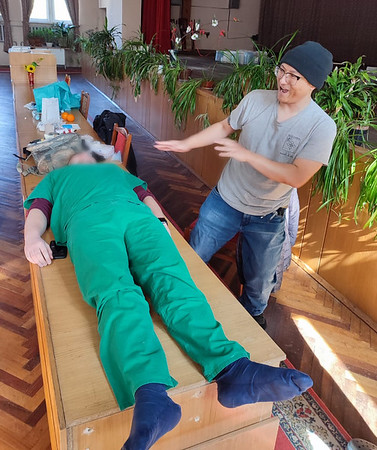“The thing I can say about Ukrainians; they’re strong people.”
That was one alum’s first thought after spending nearly a month in Ukraine as the country battles a Russian invasion.
The St. Cloud State University alumnus — who holds degrees from both the mechanical engineering and pre-physician assistant programs — plans to return to Ukraine, and in order to protect his identity, he wishes to be referred to as “Kirk” instead of his legal name.
Kirk volunteered to go over to Ukraine in early March and returned at the end of the month, taking with him his experiences as a police officer and U.S. Army medic. He also brought between $4,000 and $5,000 worth of supplies — medical supplies, rations, water tablets, medications, tactical individual first aid kits and radios — to give to Ukrainians.
“I didn’t go there to fight,” he said. “I went there to help assist the Ukrainian Ministry of Defense and Ministry of Health.”
Kirk trained citizens volunteering to fight, and also trained doctors and nurses in emergency medical care. He said that in Ukraine, health care is more specialized — medical personnel don’t have clinical rotations in other areas of medicine, and nurses as well as doctors are specialized to specific areas of treatment. When the majority of trauma surgeons and nurses were moved to more embattled cities such as Kyiv, the doctors and nurses left in other parts of the country had minimal to no trauma or emergency room experience. Kirk trained health care workers in primary assessment, secondary assessment and triage practices, and said they got firsthand experience when missiles started hitting nearby locations such as Yavoriv and Mykolaiv and they had to treat and stabilize those hurt in the attacks.
When it came to training citizens in combat tactics, Kirk trained them on how to move in formation, small unit tactics, how to conduct ambushes and counter ambushes, how to clear buildings and to set up IEDs for tanks. He said he bounced back and forth between his training duties for the defense and health ministries by day, and at night he helped unload supplies coming in. He worked in several different cities all over the country as well.
“Wherever they need me, I just go,” he said.
Kirk also had to deal with untrained civilian volunteers from outside the country who thought they were going over to Ukraine to “play live-action Call of Duty” against the Russians. They were discouraged when they ultimately had to wait weeks to pass background checks in order to carry a gun.
“This shouldn’t be the reason why you’re here. If you’re coming to Ukraine, it’s not to kill people,” he said. “That makes you no different than the Russians who are coming over here killing Ukrainians. You should be here to help.”
Kirk said that while training either soldiers or medical personnel, he had to work around hourly air raid sirens. While working with soldiers, the sirens were adhered to more often as signs to seek shelter since military personnel were considered hard targets. On the other hand, while hospital workers tried to play it safe when possible and seek shelter during the sirens, they were typically more relaxed.
“After a while, people just sort of say, ‘You know what? If we die, we die,’” Kirk said. “You have to be able to think forward, not just harp on the fact that you might die here.”
Kirk said he saw some close missile hits, one hitting an airport about five minutes from his location, and one hitting Yavoriv on his first day in the country. The worst was seeing civilians and aid workers affected by the attacks, he said. Clearly marked ambulances coming back riddled with bullet holes is an image that has stuck with him. That, and seeing humanitarian aid vehicles looking to help civilians robbed of supplies by Russian forces.
“There’s no excuse for you to shoot an ambulance up,” Kirk said. “… It’s basically piracy.”
Volunteers and soldiers alike had to contend with cyber attacks as well. Kirk said a military camp was hit with a cruise missile after the location was given away due to soldiers sending emails and other messages through their phones. Phone signals or even certain words used in messages can be picked up. Kirk still receives “email bombs” — large volumes of email meant to overflow an inbox, overwhelm the server where the address is hosted in a denial-of-service attack, or as a smoke screen to distract the attention from important messages indicating a security breach.
Upon his return home to the United States, Kirk said the misunderstandings about what’s going on in Ukraine stand out to him even more. He said some of this is probably due to misinformation from unreliable sources, and some of it is due to the distance between the U.S. and Ukraine.
“We’re a nation that, in general, accepts everybody. That’s always been in our foundation, in our Constitution and in our amendments — freedom for all,” he said. “At the same time, a lot of countries don’t have that same mentality. Like Russia — you don’t have freedom of speech, freedom to go love whoever you want or practice whatever religion you want. It’s a lot different.
“At what point do we let a different country go to basically a genocide just because they don’t want another country to have their freedoms?”
As he watched Poland open up its borders to Ukrainian refugees and helped evacuate women and children to safety, Kirk said that, should the situation ever be reversed, he hoped others would help his family too.
“Instead of saying ‘It doesn’t concern me,’ we have to start stepping into someone else’s boots and thinking ‘If that were me, would I want someone helping me?’”
Still, Kirk chooses to focus on the positive and said that’s easy to do when he thinks of the inspirational people he met.
While English is not a common second language in Ukraine, the Ministry of Defense and Ministry of Health both provided translators to assist in Kirk’s instructional training — one of them a cheesemaker, one a farmer and another a businessman before the war. One man Kirk trained in combat tactics was 80 years old, another was 18. Those who couldn’t fight but stayed anyway helped make and deliver food to soldiers and medical personnel, drive cars full of supplies, and cared for the children still in the country.
“It’s inspiring to see people from all walks of life doing everything. Even people who didn’t want to pick up a gun were doing different things,” he said. “Everyone’s got a part that they’re all playing and said they’re going to help. It’s really impressive.”
While Kirk helped evacuate families of those staying to fight who wanted their loved ones out of the country and safe, there were others who refused to separate from their families.
“Some of the women and children I talked to there were very adamant that they wouldn’t leave,” he said. “They said ‘I’d rather die here with my husband than be separated.’”
Kirk returned to the U.S. at the end of March, but plans to return to Ukraine after raising enough funds for more supplies. He used his own savings to travel and purchase the supplies he brought previously, and also pulled out of a new law enforcement job he was set to start in order to volunteer overseas.
“I know I can help, I have the means, I have the skills,” he said of his decision to voluntarily go to the war-torn area. “I knew if I didn’t go over there, I’d regret it for the rest of my life.”
Zachary Mangas, Veterans Resource Center Director at St. Cloud State, said that kind of sacrifice is just who Kirk is.
“When I received a message from Kirk informing me he was heading over to help aid in Ukraine, it did not surprise me he would want to take action,” he said. “He is a respectful and selfless guy and that was how he carried himself when he was on our campus. … We are very proud of him.”
Mangas said that April is known as the Month of the Military Child, and while the Veterans Resource Center usually has a toy drive for children of local military units who are deployed, this year the toy drive will benefit Ukrainian children who had to leave everything behind. Donations of new and gently used toys will be sent overseas to the refugee encampments, and there will be collection bins at the Veterans Resource Center and at the Student Life and Development office.
Kirk said there are a number of different organizations helping Ukraine in different ways, such as the World Health Organization, Red Cross and MedGlobal, among others. Different organizations support different needs, such as medical supplies, food and evacuation assistance.
While Ukraine can absolutely use additional resources, Kirk said the country is in no way helpless.
“Originally I thought, ‘I need to help the Ukrainians, they’re defenseless’ and stuff like that,” he said. “But when I went over there, I realized they’re strong, really motivated people. I think, even if the West didn’t send help to them, they’d find ways around it to win.”


